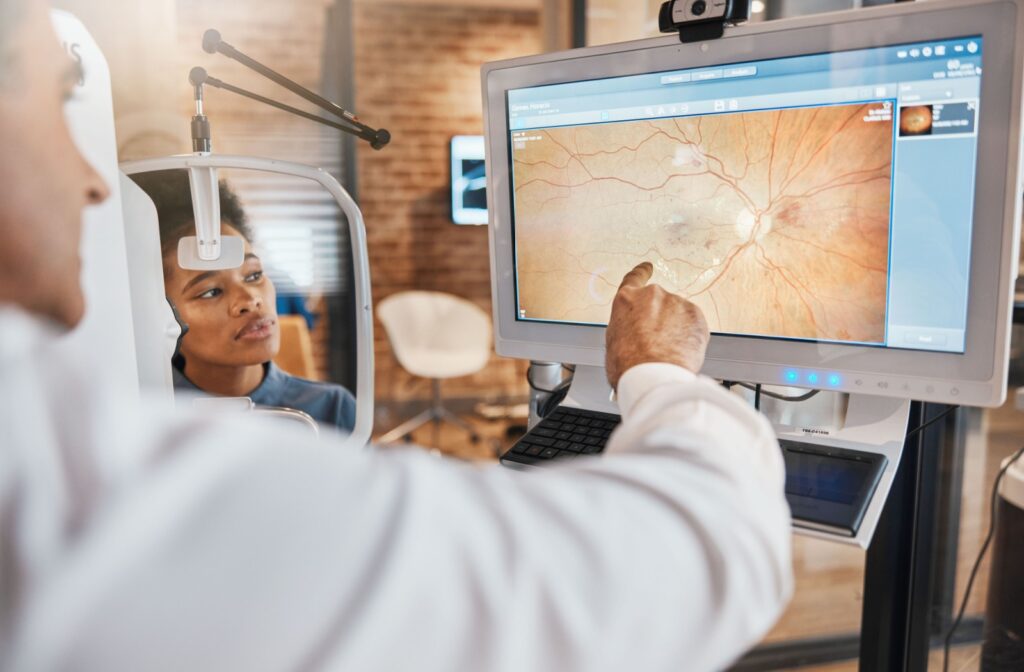Every structure in our body connects and communicates with each other. This means that even general health conditions can affect our eye health and vision.
Yes, high blood pressure can cause double vision. Leaving your blood pressure uncontrolled puts you at an increased risk of developing eye conditions, which, if left untreated, can lead to serious complications and vision loss.
High Blood Pressure’s Impact on Vision
High blood pressure, or hypertension, exerts an undue force on your blood vessels, including those supplying your eyes. This strain can cause damage to your blood vessels, leading to a host of vision problems over time.
This onset of vision concerns can seem sudden, but it’s generally the result of prolonged, uncontrolled high blood pressure.
Change may be subtle at first. Perhaps objects appear slightly blurrier or you see occasional flashes of light. Over time, as the blood vessels in your eyes continue to suffer from high pressure, these issues can escalate, sometimes resulting in double vision.
Understanding this gradual progression can help you take preventive steps before the situation worsens.
High Blood Pressure & Its Impact on Eye Health
High blood pressure affects several necessary structures within the eye, including the retina, optic nerve, and choroid.
The retina is particularly vulnerable, as it’s supplied by tiny blood vessels that can easily be damaged by consistent high pressure. When these vessels are damaged, conditions such as hypertensive retinopathy may result.
The optic nerve, responsible for transmitting visual information from the eye to the brain, can also be compromised. When blood flow to the optic nerve is restricted, this can cause optic neuropathy, leading to vision loss if not addressed promptly.
The choroid, a layer of blood vessels that supply the retina, can also suffer from impaired blood flow, exacerbating vision issues.
Eye Conditions Linked to High Blood Pressure
High blood pressure is a known risk factor for several eye conditions. It develops gradually, but symptoms may occur suddenly.
Leaving these eye conditions untreated can lead to severe complications, including vision loss. Routine eye exams are key to their early detection.
Hypertensive Retinopathy
Hypertensive retinopathy is one of the most common eye conditions caused by prolonged high blood pressure. It is characterized by damage to the blood vessels in the retina.
As blood pressure elevates, tiny vessels in the retina can become narrowed, blocked, or may begin to leak fluid, leading to a range of visual impairments. This condition can progress through different stages, starting from mild changes in the blood vessels to more severe damage that significantly impacts vision.
Symptoms usually manifest in its advanced stages, and can include:
- Double vision
- Low vision
- Blurry vision
- Sudden vision loss
Retinal Vein Occlusion
Retinal vein occlusion (RVO) is a serious condition that occurs when one of the veins responsible for draining blood from the retina becomes blocked.
This obstruction leads to reduced blood flow. As blood flow is restricted, pressure builds in the affected vein, leading to leakage of fluid and blood into the retinal tissue, which can result in swelling and damage to the retina.
Symptoms of RVO can vary depending on the severity and type of occlusion, but can include:
- Sudden blurry or distorted vision
- Dark spots
- Loss of peripheral vision
Glaucoma
Glaucoma is a group of eye conditions that damage the optic nerve.
Glaucoma typically develops when the fluid in the eye doesn’t drain properly, leading to a buildup of pressure. This increased pressure can cause damage to the optic nerve. Factors such as age, family history, eye injuries, and conditions like high blood pressure and diabetes can contribute to the risk of developing glaucoma.
The symptoms of glaucoma can vary depending on the type and stage of the disease. In the early stages, glaucoma may present no noticeable symptoms. As the disease progresses, individuals may experience:
- Double Vision
- Headaches
- Severe eye pain
- Peripheral vision loss or blind spots
Diabetic Retinopathy
For those with both diabetes and high blood pressure, the risk of developing diabetic retinopathy increases significantly.
Diabetic retinopathy is a complication of diabetes where high blood sugar levels damage the blood vessels in the retina. High blood pressure can accelerate this damage, leading to more severe and rapid progression of the condition.
Symptoms of diabetic retinopathy can include:
- Double vision
- Blurry Vision
- Floaters
- Difficulty seeing at night
Managing both diabetes and high blood pressure is important in preventing the development and progression of diabetic retinopathy.

If You’re Experiencing Double Vision. . .
Double vision can be a sign that your blood pressure is elevated.
When high blood pressure causes damage to the blood vessels in the eyes, it can interfere with the normal functioning of the visual system, leading to double vision. However, double vision can also result from other underlying issues.
Other symptoms to watch for include:
- Headaches
- Dizziness
- Nausea
- Difficulty concentrating
If you experience any of these symptoms alongside double vision, it’s important to visit your optometrist immediately. High blood pressure can be a silent killer, and addressing it early can prevent more severe complications.
Your eye doctor will conduct a thorough examination to determine the cause of your symptoms and recommend appropriate treatment. They may perform various tests on your eyes, including:
- A visual acuity test to see how well you can see at various distances.
- A slit-lamp exam to inspect the internal structures of your eye.
- A tonometry test to measure the pressure inside your eye.
- A visual field test to examine your peripheral vision.
- A dilation exam to get a better view of the retina, optic nerve, and blood vessels using retinal photos and OCT imaging.
They may also coordinate with your primary care physician to confirm your blood pressure is adequately managed.
Schedule a Visit
Uncontrolled high blood pressure is a significant health risk, not just for your eyes but for your overall well-being. Routine visits to your primary care doctor and optometrist can help detect concerns early, for effective management and treatment.
Connect with our team at Total Vision to schedule an appointment for your routine eye exam.



